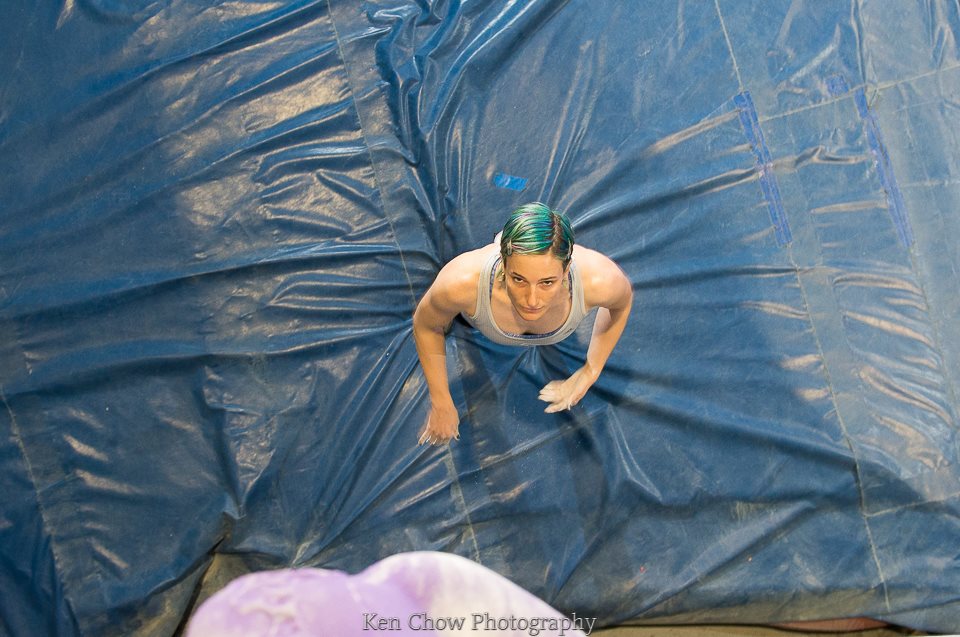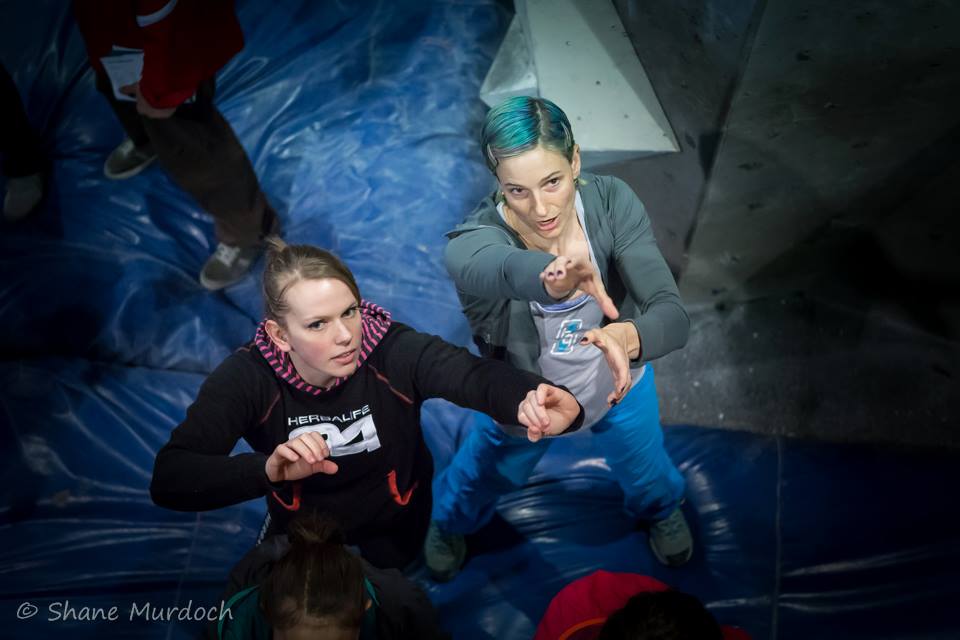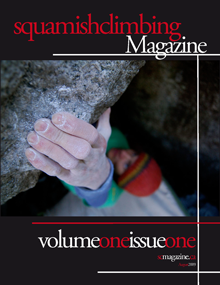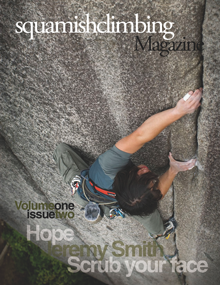Last week, we ran an interview with Tiffany Melius as she prepared for the 2016 BC Open Bouldering Provincials. Going into the event, Tiffany was ready to defend her title as Provincial Champion in a strong group of female competitors. However, her goals for that event did not go as planned. Tiffany ended up placing in sixth during the competition putting her in second place overall in the BC Provincial rankings, with the 2016 BC Open Provincial Champion title going to Alannah Yip.
Often in our interviews with competitors, we focus on the preparation for these events and then the outcome, but rarely do we have a chance to stop and reflect on what happens when an athlete doesn’t meet a goal that they set for themselves. In the sport of climbing, our personal goals are often set just below failure and in doing so we need to be able to weather the storm, reflect on those moments, and get back up and try again. Tiffany was open enough to talk about some of her reflections after this weekend and here is what she had to say.
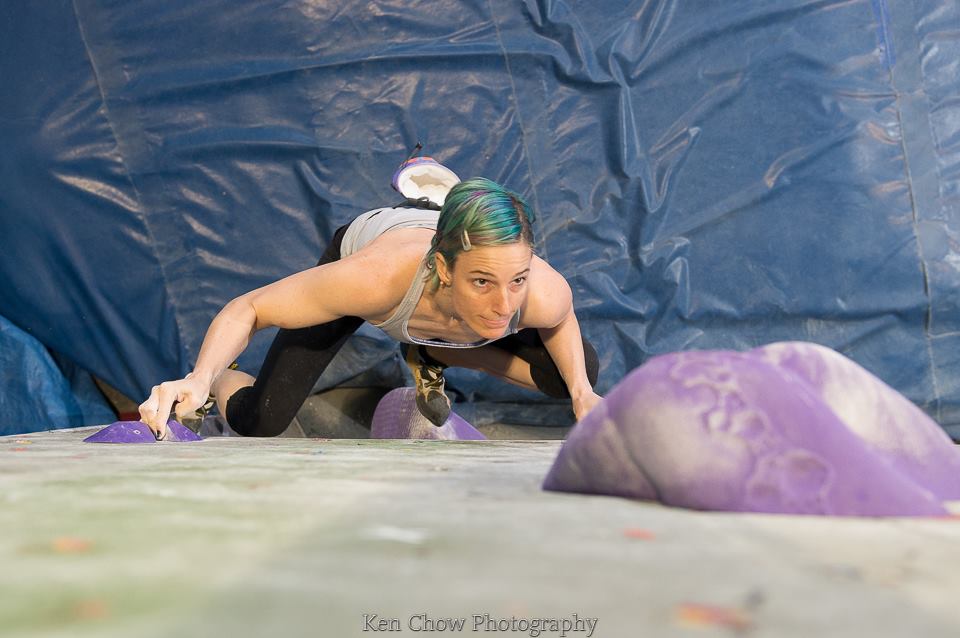
Tiffany Melius at 2016 Provincials. Photo by Ken Chow ©
Hi Tiffany, thanks for taking the time to chat with us again. Last weekend, you competed in the 2016 BC Open Bouldering Provincials and things didn’t go as expected. Can you tell us a bit what happened and what was going through your mind and body?
No problem Tim, I’m happy to chat with you again. I think that we spend so much time in sport and the media talking about the lead up and preparation to events that often the aftermath gets a bit lost. In competition how you deal with the outcome of an event can be just as important in preparing you for the next competition, and making you a better competitor overall, as what you do in the immediate lead up to an event.
I wouldn’t say what happened in the comp was unexpected since the field is so close this year – it was just not what I had hoped for. As I said in our last interview, my goal was to take the BC ranked Provincial Bouldering Champion title for the third year in a row. As it was, it came down to the last problem in finals to determine the placings, and the problem took me two attempts too many to complete.
I still felt like I climbed well, and I don’t know that there is much that I could have done differently that would have changed the outcome. But how to deal with that?
I found myself diminishing it and saying ‘it’s just one competition’. Well, it is, AND I had a goal that I didn’t achieve. I realised that by telling people that, I was trying to make myself feel better, and not actually dealing with the disappointment itself. And by saying that, I was also in a way de-valuing the goal and my courage of putting it out there beforehand (on the internet no less!), knowing that I might fail.
That is always a tricky thing. Some folks feel better about realizing a goal when sharing it with others and some don’t respond well to the pressure. Do you think putting it out there helped or hindered in this case?
I think there is a difference between declaring a goal that requires willpower (e.g. stop eating so much chocolate), and one that is based on performance. In the first case, telling others is about accountability – people are generally more likely to achieve the goal if they know that others will be watching them to see that they do. On the other hand, performance-related goals are much harder to make public because there are factors outside of your control that could cause your failure – that others won’t necessarily see – and there is a belief that we will be judged on the outcome, rather than the performance. I don’t think that putting it out there affected my performance that much, what it did though was bring another factor into the processing of the outcome after the fact – what do people think of me? I failed and what does that mean? Will this affect future prospects in sponsorship, media? etc.
The other thing that putting a goal out there does (for me at least) is bring up my self-critics – the parts of me that say ‘who are you to aim for that?’, ‘what makes you think you are good enough to achieve that?’, ‘imagine what it will feel like if you fail.’ etc. etc. That is really tough mentally to deal with and it takes a certain amount of confidence to stand in solidarity with yourself to be able to silence them.
When something like this happens, do you have a tendency to internalize it or does it motivate you to train harder for the next competition?
In this particular circumstance it doesn’t motivate me to train harder because there was no obvious physical deficit in my performance. If anything it makes me want to spend more time on reflection, rather than on physical training. If there had been specific skill or strength-related issues in my performance (as there was at the Ground Up competition) it makes me tweak my training to be more targeted on those things. I am not sure my body would handle much ‘harder’ training, so it’s about training smarter, not harder.
What will you do to prepare yourself for Nationals and build back your self-confidence?
I think acknowledging that I was trying to avoid feeling disappointed about the outcome of this competition was a big step because it means that I can actually work through it. Otherwise I would be carrying the baggage of unresolved disappointment going into training for Nationals and the competition itself.
I think there’s also an important distinction to draw here between self-confidence and disappointment/failure. I failed in achieving my goal, and I am disappointed because of that, but it didn’t affect my self confidence. Sometimes it can and will, but it doesn’t have to – the two are distinct from each other.
I think it is hard to draw the line, especially if that failure is continuous, like when trying a project or perhaps not getting on the podium. What advice would you have for other competitors out there that may experience the same thing?
I agree, it’s super difficult to draw that line. I think that working on increasing self-awareness, and self-belief outside of performance (i.e. based on your intrinsic worth), is the key to being able to separate those two things. And allowing yourself to really lean into emotion across the spectrum will create a deeper connection between who you are at your core, and your experiences.
So what’s next?
My next goal is to make the podium at Nationals. And as I say that, all those self-critics just came up again! So, I will be working on all those things for the next month! 🙂
Thanks Tiffany for your reflection and your openness to share some of your experiences with others. We wish you the best in you preparation over the upcoming months and will be in your corner for Nationals.
Tiffany is the Founder and Principal Coach at Force of Nature Coaching , and works in not-for-profit management at the United Way of the Lower Mainland. She was a Director on the inaugural Board of Sport Climbing BC from 2013-2015, and is currently Vice Chair on the Board of FEAT Canada Adventure Talks.
